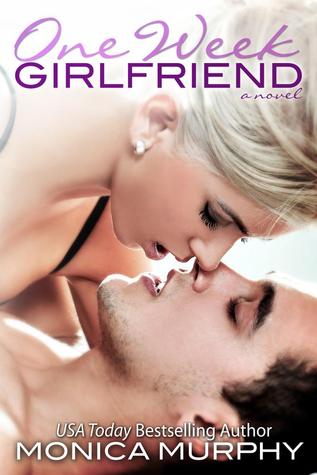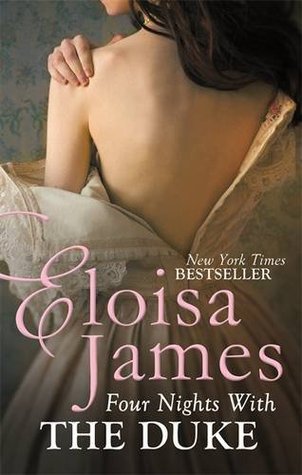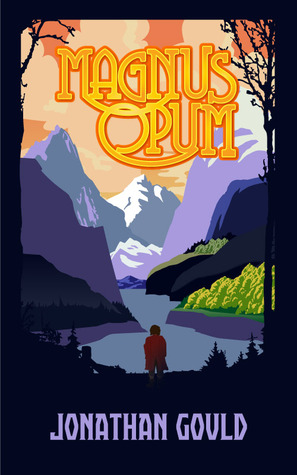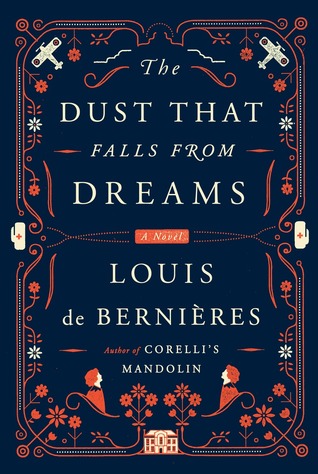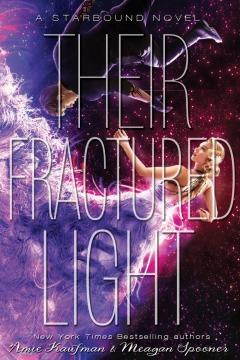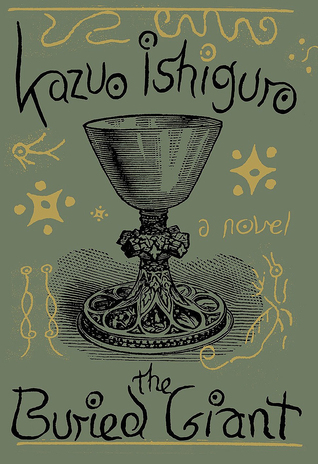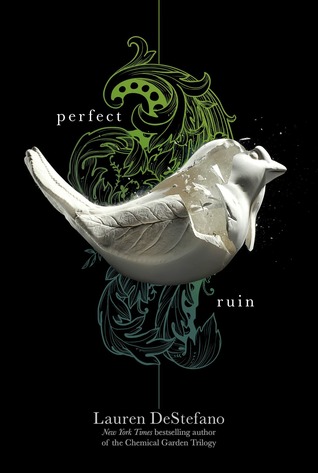Hi all! This is a few days late due to vacation, but I wanted to provide the final list of titles I read for the 2015 Popsugar Reading Challenge, along with a brief thought about each--basically whether I think it's worth reading or not. You can find links to the Goodreads listings for all of these books on my Popsugar 2015 Reading Challenge shelf
here.
-A book with more than 500 pages. For this I read Oliver Stone's
The Untold History of the United States, which is a good history book that takes an alternative (but still factual) look at some aspects of the US's history. Worth reading for those who like history.
-A book published this year.
The Secrets of Sir Richard Kenworthy, which is by Julia Quinn and came out in January 2015. Quinn's books can be a bit syrupy, and I disliked this one more than her others. I'd say go for her Bridgerton series before this one.
-A book with a number in the title. Nayomi Munaweera's
Island of a Thousand Mirrors, which takes place in Sri Lanka, is a bittersweet look at how the conflicts in race there manifest, and how they affect communities.
-A book with nonhuman characters. For this I read Brenda Pandos'
The Emerald Talisman, which has vampires in it. I hated it. There are far better paranormal romances out there. Skip this one.
-A funny book. That would be
Where'd You Go Bernadette by Maria Semple, which had me giggling to myself on several occasions. Definitely recommended!
-A
book by a female author. I read a ton of female authors, but for this one I used
Bread & Butter by
Michelle Wildgen, which was a great character-driven book that revolves
around a trio of brothers in the restaurant business. I liked it, though those who like plot-driven books with lots of forward motion would likely be disappointed.
-A mystery or thriller. Well, I finally got around to reading
Inferno. Thoughts? It's a Dan Brown book. If you liked the others, you'll probably like this, though I found the overall premise involving the virus to be more hokey than normal, and think it really backs Brown into a corner for future books.
-A book with a one-word title.
Sand by Hugh Howey is a fabulous science-fiction read
in a really interesting setting with a great cast of characters. Highly, highly recommended.
-A book of short stories. Hilary Mantel's
The Assassination of Margaret Thatcher was a very cool book of short stories that all hard really surreal aspects to them, but which were overall just real enough to be believable. I'm not a huge short story person, but this was excellent.
-A
book set in a different country. I love reading books set in
different countries, because I like to get a glimpse of places I will
likely never go myself. Aminta Arrington's
Home is a Roof Over a Pig, which is a memoir set in China, filled this category, and I liked it well enough. But if slice-of-life memoirs aren't your thing, look elsewhere.
-A nonfiction book. Sarah Churchwell wrote (and I read)
Careless People, which is about a murder that took place in the 1920s and how it might have influenced F. Scott Fitzgerald when he was writing
The Great Gatsby. I loved this.
-A book based entirely off its cover. Ugh, what a disaster this one was! I read Dorthea Benton Frank's
The Last Original Wife based
on the cover, and I hated it. It looked so beachy and light and
lovely, and it was a disaster that made me angry.
-A memoir. I read a lot of these, but for this particular category, let's go with
All the Fishes Come Home to Roost, which is Rachel Manija Brown's memoir about growing up as an American kid in an ashram in India.
-A book you can finish in a day. After removing an earlier selection (Charlie Holmberg's
The Master Magician) from this category because I didn't want to duplicate authors, I had to use Eloisa James'
Three Weeks with Lady X. I can pretty much read any Eloisa James book in under a day, because they are all delicious, and I would recommend this to historical romance lovers--though reading her other Duchess books first might help for some context.
-A trilogy. I devoured and adored Rae Carson's Girl of Fire and Thorns trilogy early this year, which is made of
The Girl of Fire and Thorns, The Crown of Embers, and
The Bitter Kingdom.
These were some of the first books I read this year, and I absolutely
loved them. I'll definitely read them again, and they really got me
back in the writing mood!
-A book set in the future. I pretty much inhaled
These Broken Stars by Amie Kaufman. It's a beautiful young adult sci-fi story with a
wonderfully worked romance aspect, and I can't wait to read the
companion books.
-A book with a color in the title. Well, that would have to be
Scarlet, Marissa Meyer's awesome sci-fi adaptation of Little Red Riding Hood, which picks up where her sci-fi version of Cinderella,
Cinder, left off. The rest of the series was good, too, but
Scarlet was definitely the strongest of the four.
-A book with magic. Vera Nazarian's magical
Cobweb Bride definitely fits this category. It got off to a slow start, but was utterly enchanting (haha, I'm so funny) by the end.
-A book by an author you've never read before.
Burial Rites by Hannah Kent fits this. I liked it, but it wasn't as mind-blowing as it was made out to be.
-A book that was originally written in a different language.
Skylight by
Jose Saramago. It's a beautiful character-driven novel that was
originally written in Portuguese and wasn't published until after the
author's death because of an early snafu with a potential publisher.
I enjoyed it, but did find it to be a bit slow, even for a character-driven novel.
-A book set during Christmas. I
hate books that are set during Christmas. I find them to be really gimmicky, all "love thy neighbor" and "God is great," which is super annoying to be hit over the head with again and again and again. But I did read
Married by Midnight by Julianne MacLean earlier
this year, not realizing at first that it was set during Christmas when I picked it up. It
was okay, I guess, but it didn't leave me rushing to pick up the others
in the series.
-A book written by an author with your same initials. Well, my initials are CH, so I'm going with
The Paper Magician by
Charlie Holmberg, which was a great Victorian-style fantasy about a
girl who learns paper magic and has to save her tutor after his heart is
literally stolen out of his chest. I loved it.
-A book a friend recommended. My friend Vilhelmina tore through Sarah J. Maas'
A Court of Thorns and Roses and pushed me to read it so we could discuss, so I tore through it, too. I liked it, a lot, but it left me a little bit nervous about the next book in the series.
-A book that made you cry. This was, unintentionally,
How To Start a Fire by Lisa Lutz.
Oh, Malcolm... A beautiful character-driven novel about three girls who come together and separate again over the course of their lives, and the triumphs and tragedies that drive their connections.
-A book you own but have never read. As I intended, I finished this one with
The Martian by Andy Weir,
reading it after owning it for about six months. It's very realistic science fiction, a great intro to the genre for
those who are interested in the concept but find the more space-opera-y
stories too out there.
-A book based on or turned into a TV show. Again, as intended, I read Charlaine Harris'
Dead Until Dark, the book that started the series that became the HBO show TrueBlood. As with the show, it was okay but I didn't like it. The whole necrophiliac aspect of vampire romances kind of creeps me out, to be honest...
-A
book set somewhere you've always wanted to visit. I eventually used Elizabeth Gillbert's
The Signature of All Things (which is partially set in Tahiti) for this category, because filling up a category was about all it was good for. Would not recommend.
-A book that became a movie. I read
Monuments Men by Robert Edsel for this one, and really liked it. I thought it was going to closely overlap with
The Rape of Europa, which I read in school, but it didn't. It's much more of a narrative history, and includes tons of stuff that
Europa didn't even touch on in regards to the Monuments Men and their efforts to protect Europe's treasures during the Allied advance. Great for WWII history fans.
-A
book more than 100 years old. I'd originally planned to use 20,000
Leagues Under the Sea for this, but I really wasn't feeling that, so I
read
A Little Princess by Frances Hodgson Burnett instead.
Published in 1905, it fit the category, and I liked the story. It's very simple, but full of heart.
-A book that came out the year you were born. I read Diana Gabaldon's
Outlander for this category, and had mixed feelings about it. I kind of hated Clare, and felt it was much too long, but I don't know...it kind of grew on me.
-A book from an author you love but haven't read yet. I read Tamora Pierce's
Battle Magic for
this, and was quite disappointed. This is definitely not her finest work, and I would really put it at the bottom of her works in quality. Read pretty much anything else by her first.
-A book at the bottom of your to-read list. I used Laura Hillenbrand's
Seabiscuit for
this, after some convoluted "reading list" math, and actually really liked it. I'm not a racing buff or fan, by any means, but this was a story with a lot of heart--and true, to boot!
-A book from your childhood.
I asked for the wonderful anniversary edition of the Harry Potter box
set for my birthday last month, and quickly read J. K. Rowling's
Harry Potter and the Sorcerer's Stone for
this. I read the book initially when I was pretty young (probably 9 or
10, I'd say) but it was definitely just as magical today as it was
then.
-A book that scares you. This was another category I ended up inadvertently filling, with Robert Levy's
The Glittering World.
It was definitely very creepy and made me sort of nauseous, in a weird
way. But I don't think I would recommend it.
-A book with a love triangle. I read Kresley Cole's
Endless Knight for this, along with its sequel
Dead of Winter. I love this series. It's a guilty pleasure of mine, though I think it's probably going to get dragged out way longer than it should.
-A book set in high school. When I couldn't get my hands on
Perks of Being a Wallflower, I read
The Unraveling of Mercy Louis by Keija Parssinen instead. While I found the writing beautiful and the story compelling, I was frustrated by the ambiguity of the ending.
-A banned book. As planned, I read
The Kite Runner by Khaled Hosseini for
this. I can see why people banned it in certain schools and areas,
though I heartily disagree with their ideas for doing so, and feel that
the beauty of the book and the compelling plot line more than outweigh
any cursing or "dangerous" depictions of homosexuality that people
object to. I'd recommend it.
-A classic romance. Leo Tolstoy's
Anna Karenina isn't a classic romance in the traditional sense, because not all aspects of it are romantic, or happy, but Tolstoy is, of course, a literary genius, and I think this is really worth reading. Much less philosophical than
War and Peace, but with the same beautiful plot at heart.
-A book written by someone under 30. Allison Beckert volunteered her book
Mishap Mansion as fitting this category, due to her age, so I bought it, read it...and didn't really enjoy it. I think there were some good ideas here but they weren't treated well, and the whole thing came off as annoying rather than enjoyable.
-A
popular author's first book. Terry Pratchett's
The Carpet People filled this. It wasn't what I expected, and I found it a bit simplistic--not surprising, considering he originally wrote it when he was 16--but I liked it. Probably a necessary read for Pratchett fans, but I don't think it was the best book of his to start with.
-A Pulitzer Prize-winning book. Anthony Doerr's
All the Light We Cannot See was absolutely beautiful and I can see why everyone loves it so much. You should read it, if you haven't already.
-A
book you were supposed to read in school but didn't. I was a good
student and read the books I was assigned, and I could only think of one
exception that wasn't an actual textbook:
Affairs of Honor by Joanne B. Freeman. It had good structure and some interesting bits but was ungodly boring. Would not recommend for pleasure reading.
-A graphic novel.
Sharaz-de by Sergio Toppi put itself forth as an adaptation of "Scheherazade," but it fell flat in my opinion. It was notable for the beautiful art, but not for the storytelling.
-A book that takes place in your hometown.
Second Position by Katherine Locke takes place in my second hometown of Washington, DC, and dealt with some very heavy subjects like amputation and miscarriage while being strikingly beautiful at the same time. Wonderful, but not light reading by any means.
-A play. I read Jean-Paul Sartre's
No Exit for this category. I know people like it, but I honestly can't recommend a play to be
read. Go see it instead; it'll make more of an impact.
-A book you started but never finished. I'm glad I came back to Hal Duncan's
Vellum for this one, because looking at it with more perspective and a fresh pair of eyes made it a book that I
loved, rather than one I despised so much I couldn't finish it--but I think it only appeals to a certain type of reader. Tread with care.
-A book based on a true story. For this, I decided to use Kate Alcott's
The Dressmaker, which relies heavily on the sinking of the
Titanic and
the trials that followed. It's good, but I've read better; the main character was too lacking for my taste.
-A book your mom loves. My mom loves
The Thorn Birds by Colleen McCullough,
and after reading it, I really enjoyed it, too. I bought my own copy after borrowing the one I read from the library, I enjoyed it so much. I think fans of
Gone with the Wind's variety of historical romance and struggle would like this, though the settings are very different in both time and place.
-A book with antonyms in the title. I hadn't even realized I completed this category until Jeffrey Cook, author of
Foul Is Fair,
pointed out that his title counted for it! Doi! This was good, but lacked the dark edge of most faerie books, which is (in my opinion) what makes them tantalizing.
-A book with bad reviews. I used Maggie Shipstead's
Seating Arrangements for this, after seeing the reviews when I finished the book--I hadn't looked at them in advance. The rating isn't terrible but the reviews certainly aren't favorable, and I could see why. I didn't hate it, but also didn't enjoy it. Just a
meh title for me.
 The Goldfinch was listed as one of the most-abandoned books by Amazon, based on reader tracking data acquired from Kindle software. This is probably for a few reasons. First, it's quite long for a fiction title, at nearly 800 pages. Second, despite a promising beginning, it doesn't move particularly fast. Things are building up in the background the entire time, but nothing is really happening in the foreground, which probably frustrates a lot of readers more familiar with fast-moving titles like the works of Dan Brown. You really have to care about the characters in order for this book to pull you on, and not all readers are deeply character-connected. And with a book this thick, with not that much blatant action occurring...well, it's an easy one to put down, meaning to continue on, and then just kind of forget about. But not me. No, this was one of Amazon's most abandoned books, which some might see as a deterrent, but which I (and probably a good number of other people) saw as a challenge.
The Goldfinch was listed as one of the most-abandoned books by Amazon, based on reader tracking data acquired from Kindle software. This is probably for a few reasons. First, it's quite long for a fiction title, at nearly 800 pages. Second, despite a promising beginning, it doesn't move particularly fast. Things are building up in the background the entire time, but nothing is really happening in the foreground, which probably frustrates a lot of readers more familiar with fast-moving titles like the works of Dan Brown. You really have to care about the characters in order for this book to pull you on, and not all readers are deeply character-connected. And with a book this thick, with not that much blatant action occurring...well, it's an easy one to put down, meaning to continue on, and then just kind of forget about. But not me. No, this was one of Amazon's most abandoned books, which some might see as a deterrent, but which I (and probably a good number of other people) saw as a challenge.

